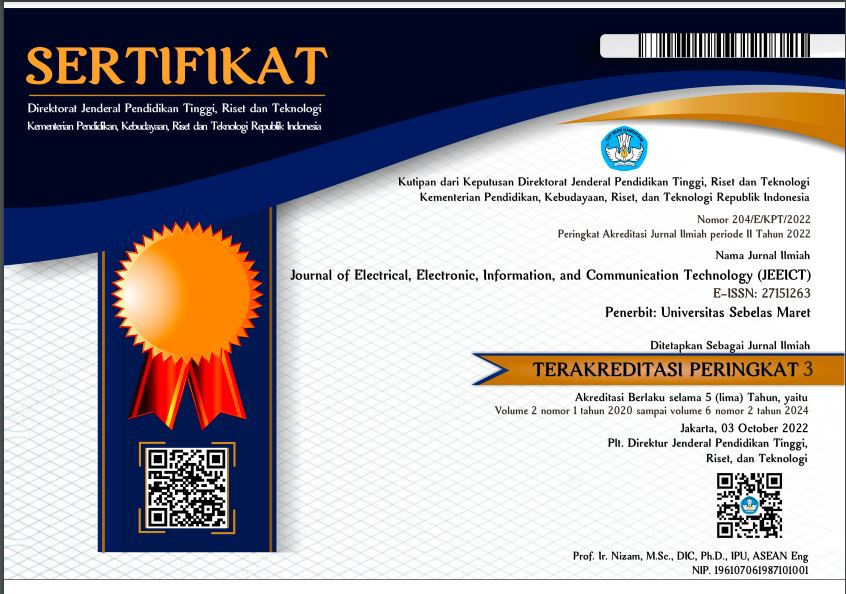Adaptive Cruise Control based Motor Acceleration Control using Fuzzy Logic Methods
Abstract
The paper presents a method for adaptive cruise control based motor acceleration control. On the long-distance driving, using vehicles that have a risk for accidents. One of these accidents is collisions between vehicles in front of them which can cause multiple collisions. With the help of the ACC feature, it can reduce the occurrence of these accidents which are caused by the driver's fatigue and weather conditions on long-distance trips. By using the Fuzzy adaptive cruise control system, it is successful in adjusting the acceleration set on the fuzzy system, and with the help of the GUI it can make it easier for the operator to set the appropriate acceleration.
Full Text:
PDFReferences
Qory Hidayati and Mikail Eko Prasetyo, “Pengaturan Kecepatan Motor DC dengan Menggunakan Mikrokontroler Berbasis Fuzzy-PID”, Jurnal Teknologi Terpadu, vol. 4, no. 1, Juni.
Noor Cholis and Didin Sefudin, “Developing Adaptive Cruise Control Based on Fuzzy Logic Using Hardware Simulation,” International Journal of Electrical and Computer Engineering (IJECE), vol. 4, no. 6, pp. 944-951, December 2014.
Irkhos and Suprijadi, “ Simulasi Kontrol Temperatur Berbasis Fuzzy Logic untuk Tabung Sample Minyak Bumi pada Metode Direct Subsurface Sampling”, Jurnal Otomasi Kontrol Instrumentasi, vol. 4, no.1, 2012.
Nadya Febriany, “Aplikasi Metode Fuzzy Mamdani dalam Penentuan Status Gizi dan Kebutuhan Kalori Harian Balita Menggunakan Software Matlab”, Universitas Pendidikan Indonesia.
Dey, Kakan C., et al. "A review of communication, driver characteristics, and controls aspects of cooperative adaptive cruise control (CACC)." IEEE Transactions on Intelligent Transportation Systems 17.2 (2015): 491-509.
Shladover, Steven E., et al. "Cooperative adaptive cruise control: Definitions and operating concepts." Transportation Research Record 2489.1 (2015): 145-152.
Dòria-Cerezo, Arnau, et al. "A variable structure-based algorithm for adaptive cruise control." 2018 15th International Workshop on Variable Structure Systems (VSS). IEEE, 2018.
Li, Ye, et al. "Evaluating the safety impact of adaptive cruise control in traffic oscillations on freeways." Accident Analysis & Prevention 104 (2017): 137-145.
A.-M. Petri and D. M. Petreuș, “Adaptive Cruise Control in Electric Vehicles with Field-Oriented Control,” Applied Sciences, vol. 12, no. 14, p. 7094, Jul. 2022, doi: 10.3390/app12147094.
Abo-Khalil, A.G., Abdelkareem, M.A., Sayed, E.T., Maghrabie, H.M., Radwan, A., Rezk, and H., Olabi, A.G. “Electric vehicle impact on the energy industry, policy, technical barriers, and power systems.,” Int. J. Thermofluids 2022.
Hidayatullah, M.R. and Juang, J.C. “Adaptive Cruise Control with Gain Scheduling Technique under Varying Vehicle Mass.,” IEEE Access, 2021.
Chu, H., Guo, L., Yan, Y., Gao, B., and Chen, H. “Self-Learning Optimal Cruise Control Based on Individual Car-Following Style.,” IEEE Trans. Intell. Transp. Syst., 2020.
Mamouei, M., Kaparias, I., and Halikias, G., “A framework for user and system-oriented optimization of fuel efficiency and traffic flow in adaptive cruise control.,” Transportation Research Part C: Emerging Technologies, 2018.
Zhao, R. C., Wong, P. K., Xie, Z. C., and Zhao, J., “Real-time weighted multi-objective model predictive controller for adaptive cruise control systems.,” International Journal of Automotive Technology, 2017.
Shaout, A., Jarrah, M.A., “Cruise control technology review.,” Comput. Electr. Eng., 1997.
Refbacks
- There are currently no refbacks.







